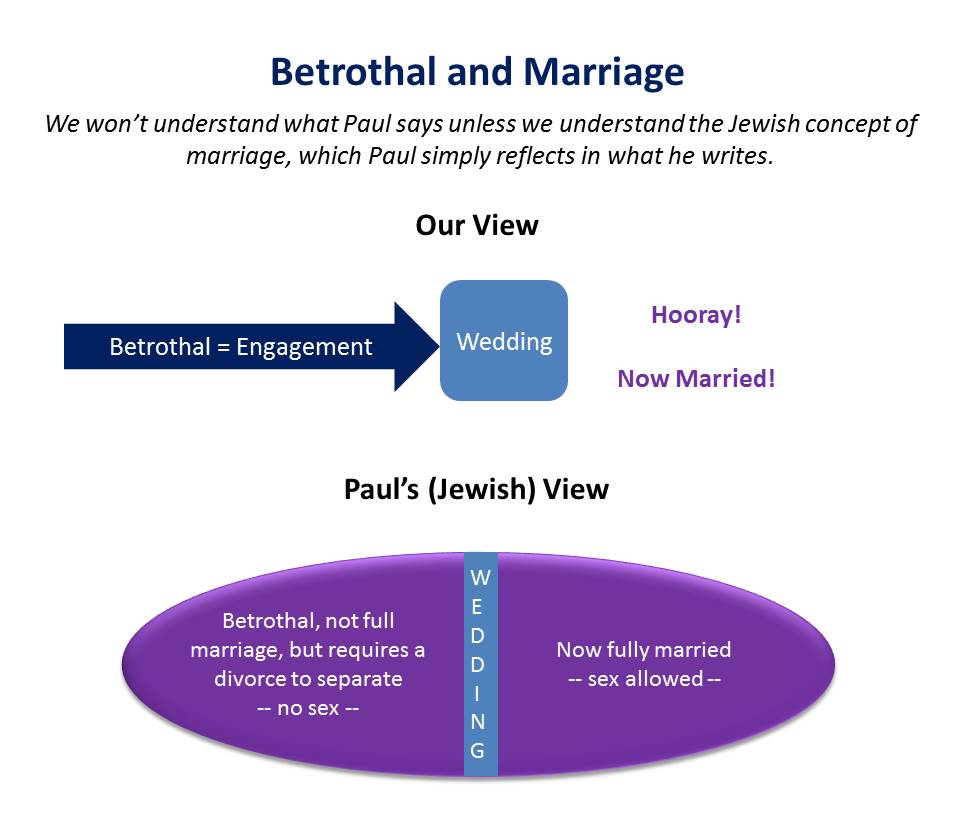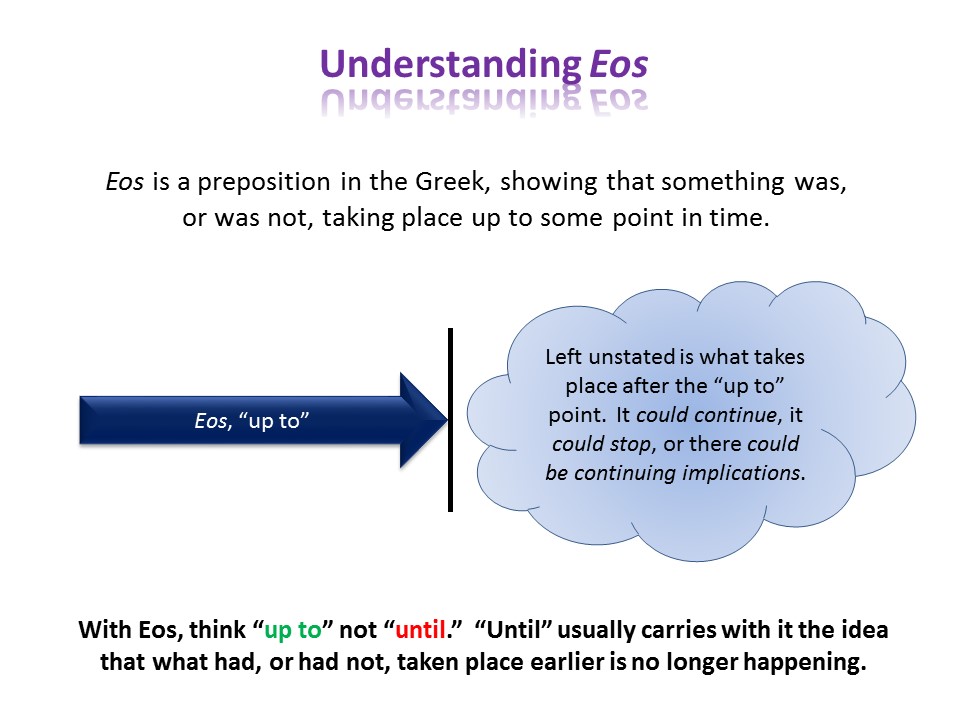 Paul is viewing life based on the reality that Christ could return at any time. Jesus’ birth, death, and ascension into heaven means that God has accomplished everything needed for Jesus’ return. That’s why Paul says, “The present form of this world is passing away” (1 Corinthians 7:31). Paul now applies that same worldview to a man and woman contemplating what they should do in light of the “present distress” (1 Corinthians 7:26).
Paul is viewing life based on the reality that Christ could return at any time. Jesus’ birth, death, and ascension into heaven means that God has accomplished everything needed for Jesus’ return. That’s why Paul says, “The present form of this world is passing away” (1 Corinthians 7:31). Paul now applies that same worldview to a man and woman contemplating what they should do in light of the “present distress” (1 Corinthians 7:26).
Marriage and Celibacy Continued
Read 1 Corinthians 7:36-38
- What does Paul encourage for those who don’t have the gift of celibacy, whose “passions are strong”?
- What does Paul encourage for those who are betrothed but who have their desires under their control?
- What is Paul’s opinion on which way is best, if possible, even for those who are “betrothed”?
- Whom do we read about in the New Testament who were betrothed but, as far as we know, never had their wedding, thus never become fully married?
Advice for Widows
Read 1 Corinthians 7:39-40
- If a widow (or person) is to marry after becoming a Christian, what stipulations does Paul apply?
- What is Paul’s preference about someone being celibate or getting married?
Food Sacrificed to Idols
This section begins with, “Now concerning,” showing that chapters 8 through 10 are a response to the letter that Paul had earlier received from Corinth. We now enter a new train of thought dealing with the issue of whether it’s okay to eat the meat that was earlier sacrificed to idols.
Although we don’t have to deal this topic today, that does not mean that this section in 1 Corinthians has little value for us. For through this issue, we learn, first, how to deal with our surrounding culture, even in areas that are not, in themselves, wrong. Second, we understand the role between doctrine and practice, in this case, the content of the Faith (doctrine) being lived out in love (practice).
Like Paul’s previous discussions, this discussion is also within a larger chiastic structure:
A 8:1-13 Dealing with food sacrificed to idols
. B 9:1-10:13 Paul (9:1-27) and the Old-Covenant Israelites (10:1-13) as examples
A’ 10:14-11:1 Dealing with food sacrificed to idols
Read 1 Corinthians 8:1-3
- What does Paul say that all Christians have? (vs. 1a)
- But what needs to be distinguished from knowledge? (vs. 1b)
- What does Paul say to those who are “know-it-alls”? (vs. 2)
- What is Paul doing in 1 Corinthians 8:3?
Knowledge puffs up, but love builds up: Here the ESV does a splendid job in its translation. The Greek for “puffs up” is physioi, which has the sound of someone filling his lungs. The ESV’s “puffs up” also conveys that onomatopoeia, a word or phrase that imitates or resembles the source of the sound that it describes.
It’s not that knowledge is evil; after all, Paul had praised the Corinthians for their knowledge at the beginning of 1 Corinthians (1:5). But knowledge without love, as Paul will say later in 1 Corinthians, reduces someone to nothing (13:2). It is like a bunch of hot air, which is useless for “building up.”
Read 1 Corinthians 8:4-6
- What truth does Paul recognize in the reasoning of those who were eating meat sacrificed to idols?
“An idol has no real existence”: Some in the congregation in Corinth may have taken their line of thinking from the Old-Testament Apocrypha book of Wisdom (remember their Old Testament was the Septuagint, which contained the books of the Apocrypha):
But they are miserable, with their hopes set on dead things. They give the name “gods” to the works of human hands, gold and silver fashioned with skill, the images of animals or a useless stone, the work of an ancient hand…. someone preparing to sail and about to traverse the wild waves cries out to a piece of wood more fragile than the ship that carries him. [Wisdom 13:10, 14:1]
But what they didn’t include in their thought process was this further line of thinking about idols and idolatry: “For the worship of idols not to be named is the beginning, cause, and end of every evil” (Wisdom 14:27).
Wisdom recognized that idols are not really gods, which is what those who ate the meat sacrificed to idols also recognized. But they stopped there, not recognizing the harm and evil that can come with things associated with such idols and their worship.
Read 1 Corinthians 8:7-9
- Who is the “all” to whom Paul refers in vs. 7?
Excursus: Synetheia and Eos
The ESV translated the Greek word, synetheia, as “through former association.” Synetheia carries with it the idea of doing something habitually. What the ESV doesn’t translate is eos arti, “up to now.”
Some examples of eos:
- 2 Samuel 6:23 (from the Septuagint): “And Saul’s daughter Michal had no child up to [eos] the day of her death.”
- Left unstated is the continuing state of Michal not having children after her death (obviously!).
- Matthew 28:20: “And remember, I [Jesus] am with you [the Apostles] always, up to [eos] the end of the age.”
- Left unstated is Jesus being present with His Apostles after the end of the age. However, “until” implies that Jesus’ presence will somehow go away after the end of the age.
- Matthew 1:25: “And he [Joseph] did not have sexual relations with her [Mary] up to [eos] the birth of a son.”
- Left unstated is that Joseph may or may not have had sex with Mary. It all depends on whether Joseph kept Mary as his betrothed or entered into full-fledged marriage. “Until” implies that Joseph had entered into full marriage and did have sex with Mary.
- 1 Corinthians 8:7: “Some, because of their habitual association with idols up to [eos] now, eat [such] meat as sacrificed to an idol, and their conscience, being weak, is defiled.”
- Left unstated is the continuing effect of their earlier, habitual pagan worship: It still negatively affected them. Paul fills in this implication of eos by then stating it clearly: “their conscience, being weak, is defiled.”
Some in the Corinthian congregation were recent converts, who had a lifetime of habitual pagan worship. They now knew intellectually that such idols were not real gods. However, emotionally, they were not able to handle the idea of Christians eating food sacrificed to such idols, for such eating carried with it the idea that someone was okay with such pagan worship.
Perhaps, this can help us understand their visceral reaction. Imagine smoking around a life-long smoker who had quit within the last few months. He no longer smokes and no longer has physical, withdrawal symptoms. Is it okay to smoke around him?
———-
- When Paul says, “Food will not commend us to God,” what food is he talking about?
- How would Christian love inform the living out of the faith for those who are “weak”?
Read 1 Corinthians 8:10-11
- What can eating such meat, especially when still in or around the pagan temple, lead a weaker brother to do?
- What then can that lead to?
Using our previous example about smoking around a former smoker, this would be akin to your smoking drawing him back into smoking.
Read 1 Corinthians 8:11-12
- Against whom does one sin when he sins against a Christian brother in such a way?
- Why?
- What then is the obvious conclusion?
- Discuss: It’s not about Christian “rights” but serving your brother and helping keep him strong in the Faith.
Click here to go to the next Lesson.




